How Religion is Portrayed in The Simpsons
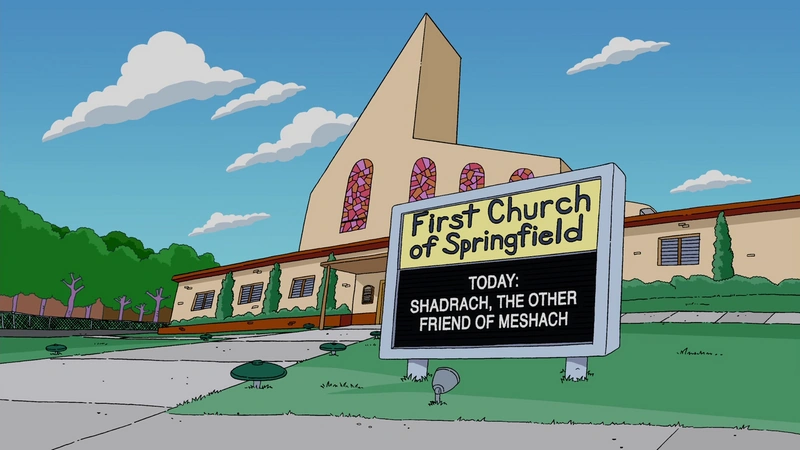
Philosopher Karl Marx believed that religion is the
product of an oppressed culture desiring a better life. Although people may be
upset with their current predicaments, the use of religion allows them to deal
with their situation. It not only encourages them to work harder to overcome
their issues, but it provides false hopes about salvation in the afterlife.
These ideals provide solace to the masses, allowing them to continue life
regardless of their struggles. The use of religion to deal with hardship can be
observed in various cultures, but it is also present in The Simpsons. Whether it be a form of Catholicism, Judaism,
Hinduism, or Buddhism, the inhabitants of Springfield manage to use religion as
an outlet for their issues, giving them the strength to continue living their
lives.
Most of the characters in Springfield, including the
Simpson family, are members of the First Church of Springfield. Although it is
said to be a “Presbylutheran” church, the religion practiced highly resembles
mainline Protestantism. Each week the congregation meets on Sunday to hear
Reverend Lovejoy give a sermon. Although some of the characters in attendance,
such as Ned Flanders, highly value worshiping God, other members do not care
much about practicing their religion. One such person is Homer Simpson, who
believes going to church is boring because all he does there is hear lectures
about how he will someday end up in Hell. As a result, he will occasionally
miss mass to stay at home and relax. In some cases, Homer has even listened to
football games during mass instead of paying attention to Lovejoy’s sermons.
There are some cases, however, when even Homer decides to rely upon religion to
help him make sense of his life. In an episode from season one, he complains
about how uncivilized his family is compared to others, and he decides to pray
to God with hopes that he will be pitied for his situation. In The Simpson’s Movie, Homer tries to use
the Bible to help his father, who has been contacted by God to deliver a
prophesy about Springfield.
Even Bart, who is not very religious, finds
inspiration to pray in this film. When a bomb is set to destroy Springfield, he
heads to church and asks Flanders if he can pray with him. Despite some of
Springfield’s Presbylutherans not having much faith, they always seem to turn
to the Lord in times of need, knowing it can make them feel better.
Dr. Hibbert and his family do not attend the same church
as most characters. Rather, they are members of the First African Methodist
Episcopal Church of Springfield. While a religion similar to the branch of
Protestantism worshipped by most characters, the majority of the congregation
consists of African Americans. Another major difference from the First Church
of Springfield is the way worship is performed here. Rather than having those
in attendance sit quietly and listen to lectures from a priest, the church
allows its followers to actively participate in mass by singing and clapping
hymns. When the Simpson family needs to see Dr. Hibbert here because Maggie is
not feeling well, Bart reacts to what he sees by exclaiming, “This is awesome!
Black God rules!”
Although the Hibbert family may not worship God in the same manner as most characters, their devout nature to their religion is definitely clear.
Although the Hibbert family may not worship God in the same manner as most characters, their devout nature to their religion is definitely clear.
Krusty, unlike the majority of characters in The Simpsons, is Jewish. In the episode
“Today I am a Clown,” he admits that he is technically not a Jew because he
never had completed his bar mitzvah. Interestingly enough, this does not
disqualify someone as being considered a Jew in real life. With the help of
Lisa, Krusty manages to have a bar mitzvah, which makes him feel as though he
is now a real man. This episode also reveals that Krusty’s father is a rabbi,
and their relationship shines throughout the episode.

Although Krusty may not follow the main religion as the majority of Springfieldians, he still cares about becoming a member of the Jewish community, proving once again how important religion is to the characters in this show.

Although Krusty may not follow the main religion as the majority of Springfieldians, he still cares about becoming a member of the Jewish community, proving once again how important religion is to the characters in this show.
Although Buddhism may not be worshipped by many
characters in The Simpsons, Lisa does
seriously commit to being a follower of this religion. In the episode “She of
Little Faith,” she decides to practice at a Buddhist temple after becoming
skeptical of her own faith. Actor Richard Gere makes a cameo to help Lisa
through this transition, which also allows the episode to make fun of his
faith.
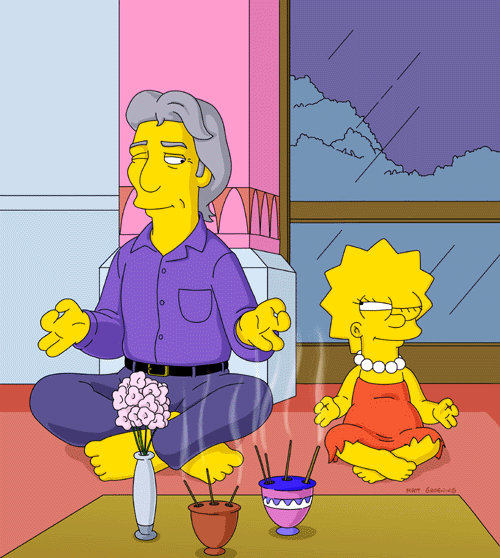
Buddhism is also briefly mentioned in The Simpsons Movie. When the government tells Springfield’s residents that a bomb will soon destroy the town, Ned Flanders consoles children about how they will be with Jesus in Heaven. He the becomes irate when one of his sons ask if Buddha will also be there. Although it may not be the most followed religion in Springfield, Buddhism is a very real option for characters in The Simpsons.

Buddhism is also briefly mentioned in The Simpsons Movie. When the government tells Springfield’s residents that a bomb will soon destroy the town, Ned Flanders consoles children about how they will be with Jesus in Heaven. He the becomes irate when one of his sons ask if Buddha will also be there. Although it may not be the most followed religion in Springfield, Buddhism is a very real option for characters in The Simpsons.
Besides Ned Flanders, one of the most religiously devout
characters in the show is Apu. Throughout the series, he has made it clear that
he is a Hindu, and various aspects of his religion show up in various episodes.
He has a statue of the god Ganesha at his Quick-E-Mart.
While some characters, such a Homer, may make fun of the statue, Apu is quick to reprimand them and tell them to leave. He is further infuriated when Homer tells him that, “when they were handing out religions” he “must have been taking a whizz.” Apu also makes sure to carefully follow the rules of Hinduism. When Krusty Burger offers a vegetarian option, he is thrilled because he can finally consume a burger without interfering with his religious practices.
Even though there are some cases where he may be sinful, he regrets his actions and always tries to make amends. After being caught having an affair, Apu tries to make it up to his wife by apologizing and fulfilling her desires to prove he still loves her. Although he does have some flaws, Apu’s strong faith in Hinduism makes him one of the most devout characters in The Simpsons.
While some characters, such a Homer, may make fun of the statue, Apu is quick to reprimand them and tell them to leave. He is further infuriated when Homer tells him that, “when they were handing out religions” he “must have been taking a whizz.” Apu also makes sure to carefully follow the rules of Hinduism. When Krusty Burger offers a vegetarian option, he is thrilled because he can finally consume a burger without interfering with his religious practices.
Even though there are some cases where he may be sinful, he regrets his actions and always tries to make amends. After being caught having an affair, Apu tries to make it up to his wife by apologizing and fulfilling her desires to prove he still loves her. Although he does have some flaws, Apu’s strong faith in Hinduism makes him one of the most devout characters in The Simpsons.
Although various religions are worshipped in The Simpsons, each one is used to bring
peace to those who follow it. Even if some characters, such as Bart and Homer,
may not be devout at times, they always seem to come back to religion, knowing
faith can help them through difficult times. Some viewers may disapprove of the
show’s use of comedic use of religion throughout the series, but others praise
it how it depicts spirituality as an important part of life. Through showing how
religion is valuable for all of Springfield’s residents, The Simpsons shows the true significance of having a faith to rely
upon during troubling situations.
Sources:
Beeden, Alexandra, and Miezan Van Zyl. The Sociology Book. DK, Penguin Random House, 2015.
Reiss, Jana. "5 'Simpsons religion episodes that are worth another look". Religion News Service, 22 Aug. 2014. https://religionnews.com/2014/08/22/5-simpsons-religion-episodes-worth-another-look/
"Religion and the Simpsons". Religion and Ethics Newsweekly, PBS, 27 Jul. 2007. https://www.pbs.org/wnet/religionandethics/2007/07/27/july-27-2007-religion-and-the-simpsons/7177/
The Simpsons: The Complete Series. Created by Matt Groening, Twentieth Century Fox, 1989-2018.
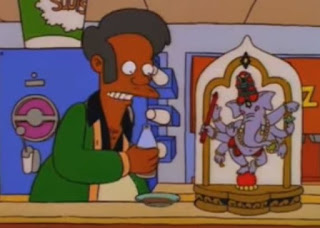
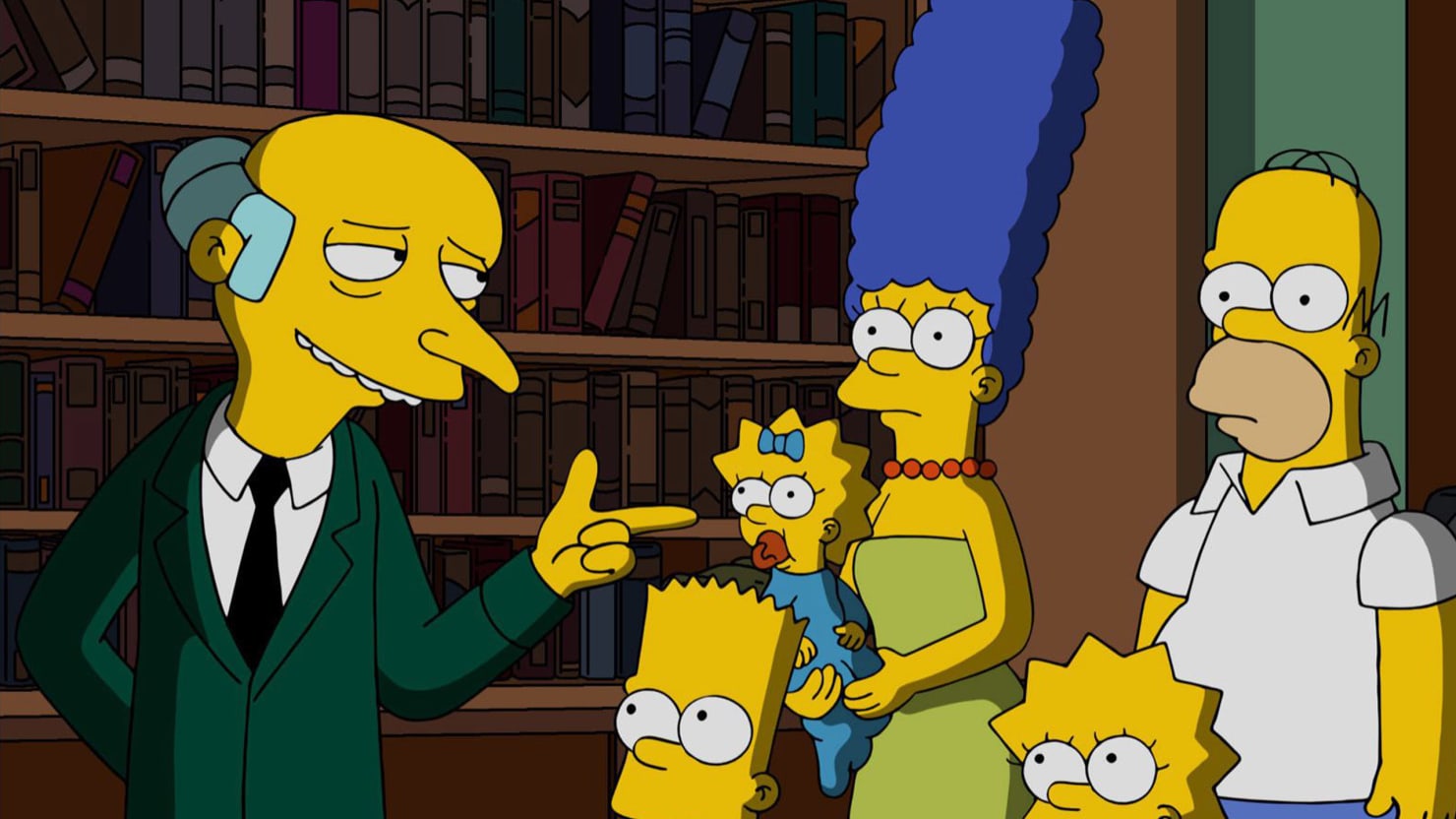

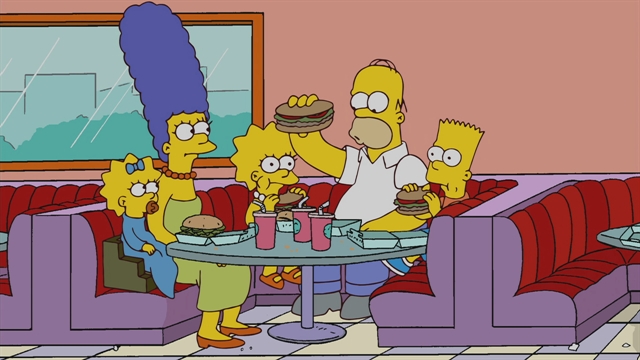
:no_upscale()/cdn.vox-cdn.com/uploads/chorus_asset/file/7050097/jobs-over-time2.0.png)